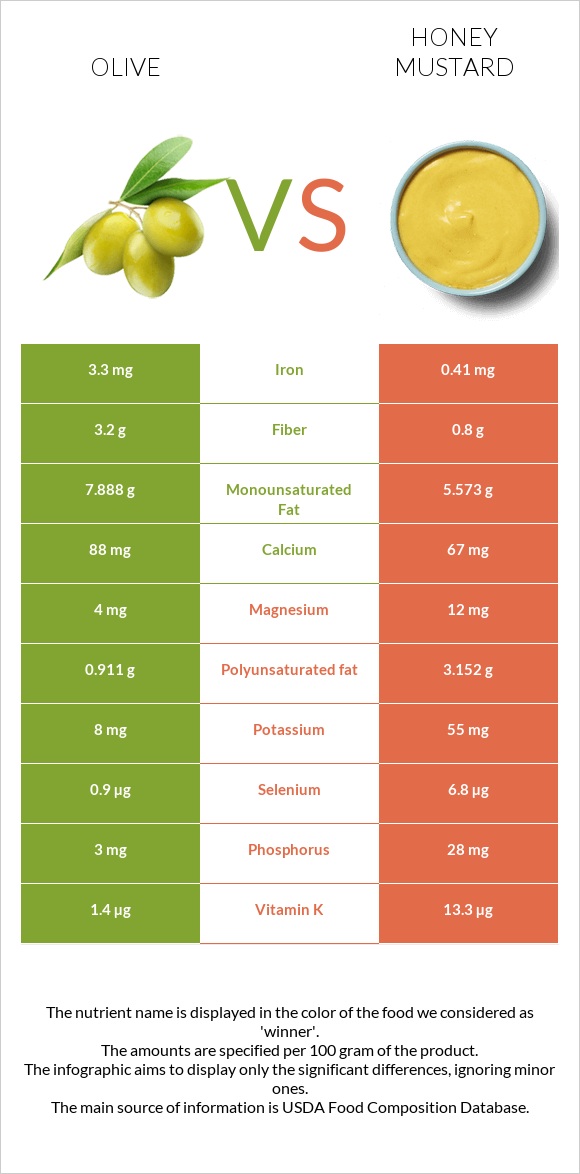Olive vs. Honey mustard — In-Depth Nutrition Comparison
Compare
How are olive and honey mustard different?
- Olive is higher in iron, copper, fiber, and vitamin A; however, honey mustard is richer in selenium, vitamin K, vitamin B1, and manganese.
- Daily need coverage for iron for olive is 36% higher.
- Olive contains 29 times more vitamin A than honey mustard. While olive contains 403 IU of vitamin A, honey mustard contains only 14 IU.
Olives, ripe, canned (small-extra large) and Salad dressing, honey mustard dressing, reduced calorie are the varieties used in this article.
Infographic

Infographic link
Mineral Comparison
Mineral comparison score is based on the number of minerals by which one or the other food is richer. The "coverage" charts below show how much of the daily needs can be covered by 300 grams of the food.
| Contains more CalciumCalcium | +31.3% |
| Contains more IronIron | +704.9% |
| Contains more CopperCopper | +904% |
| Contains more ZincZinc | +29.4% |
| Contains more MagnesiumMagnesium | +200% |
| Contains more PotassiumPotassium | +587.5% |
| Contains more PhosphorusPhosphorus | +833.3% |
| Contains more ManganeseManganese | +620% |
| Contains more SeleniumSelenium | +655.6% |
Vitamin Comparison
Vitamin comparison score is based on the number of vitamins by which one or the other food is richer. The "coverage" charts below show how much of the daily needs can be covered by 300 grams of the food.
| Contains more Vitamin CVitamin C | +125% |
| Contains more Vitamin AVitamin A | +1900% |
| Contains more Vitamin EVitamin E | +13% |
| Contains more Vitamin B1Vitamin B1 | +2233.3% |
| Contains more Vitamin B2Vitamin B2 | +∞% |
| Contains more Vitamin B3Vitamin B3 | +218.9% |
| Contains more Vitamin B5Vitamin B5 | +373.3% |
| Contains more Vitamin B6Vitamin B6 | +122.2% |
| Contains more Vitamin KVitamin K | +850% |
| Contains more FolateFolate | +∞% |
All nutrients comparison - raw data values
| Nutrient |  |
 |
DV% diff. |
| Iron | 3.3mg | 0.41mg | 36% |
| Copper | 0.251mg | 0.025mg | 25% |
| Polyunsaturated fat | 0.911g | 3.152g | 15% |
| Selenium | 0.9µg | 6.8µg | 11% |
| Fiber | 3.2g | 0.8g | 10% |
| Vitamin K | 1.4µg | 13.3µg | 10% |
| Carbs | 6.26g | 28.26g | 7% |
| Vitamin B1 | 0.003mg | 0.07mg | 6% |
| Monounsaturated fat | 7.888g | 5.573g | 6% |
| Calories | 115kcal | 207kcal | 5% |
| Manganese | 0.02mg | 0.144mg | 5% |
| Phosphorus | 3mg | 28mg | 4% |
| Saturated fat | 1.415g | 0.833g | 3% |
| Magnesium | 4mg | 12mg | 2% |
| Calcium | 88mg | 67mg | 2% |
| Vitamin A | 20µg | 1µg | 2% |
| Fats | 10.68g | 10g | 1% |
| Vitamin C | 0.9mg | 0.4mg | 1% |
| Potassium | 8mg | 55mg | 1% |
| Sodium | 735mg | 701mg | 1% |
| Vitamin E | 1.65mg | 1.46mg | 1% |
| Vitamin B2 | 0mg | 0.013mg | 1% |
| Vitamin B3 | 0.037mg | 0.118mg | 1% |
| Vitamin B5 | 0.015mg | 0.071mg | 1% |
| Vitamin B6 | 0.009mg | 0.02mg | 1% |
| Folate | 0µg | 2µg | 1% |
| Choline | 10.3mg | 4.9mg | 1% |
| Protein | 0.84g | 0.98g | 0% |
| Net carbs | 3.06g | 27.46g | N/A |
| Sugar | 0g | 18.33g | N/A |
| Zinc | 0.22mg | 0.17mg | 0% |
| Trans fat | 0g | 0.003g | N/A |
| Threonine | 0.026mg | 0% | |
| Isoleucine | 0.031mg | 0% | |
| Leucine | 0.05mg | 0% | |
| Lysine | 0.032mg | 0% | |
| Methionine | 0.012mg | 0% | |
| Phenylalanine | 0.029mg | 0% | |
| Valine | 0.038mg | 0% | |
| Histidine | 0.023mg | 0% | |
| Omega-6 - Eicosadienoic acid | 0.002g | N/A |
Macronutrient Comparison
Macronutrient breakdown side-by-side comparison
Protein:
0.84 g
Fats:
10.68 g
Carbs:
6.26 g
Water:
79.99 g
Other:
2.23 g
Protein:
0.98 g
Fats:
10 g
Carbs:
28.26 g
Water:
57.19 g
Other:
3.57 g
| Contains more WaterWater | +39.9% |
| Contains more ProteinProtein | +16.7% |
| Contains more CarbsCarbs | +351.4% |
| Contains more OtherOther | +60.1% |
~equal in
Fats
~10g
Fat Type Comparison
Fat type breakdown side-by-side comparison
Saturated fat:
Sat. Fat
1.415 g
Monounsaturated fat:
Mono. Fat
7.888 g
Polyunsaturated fat:
Poly. Fat
0.911 g
Saturated fat:
Sat. Fat
0.833 g
Monounsaturated fat:
Mono. Fat
5.573 g
Polyunsaturated fat:
Poly. Fat
3.152 g
| Contains more Mono. FatMonounsaturated fat | +41.5% |
| Contains less Sat. FatSaturated fat | -41.1% |
| Contains more Poly. FatPolyunsaturated fat | +246% |





